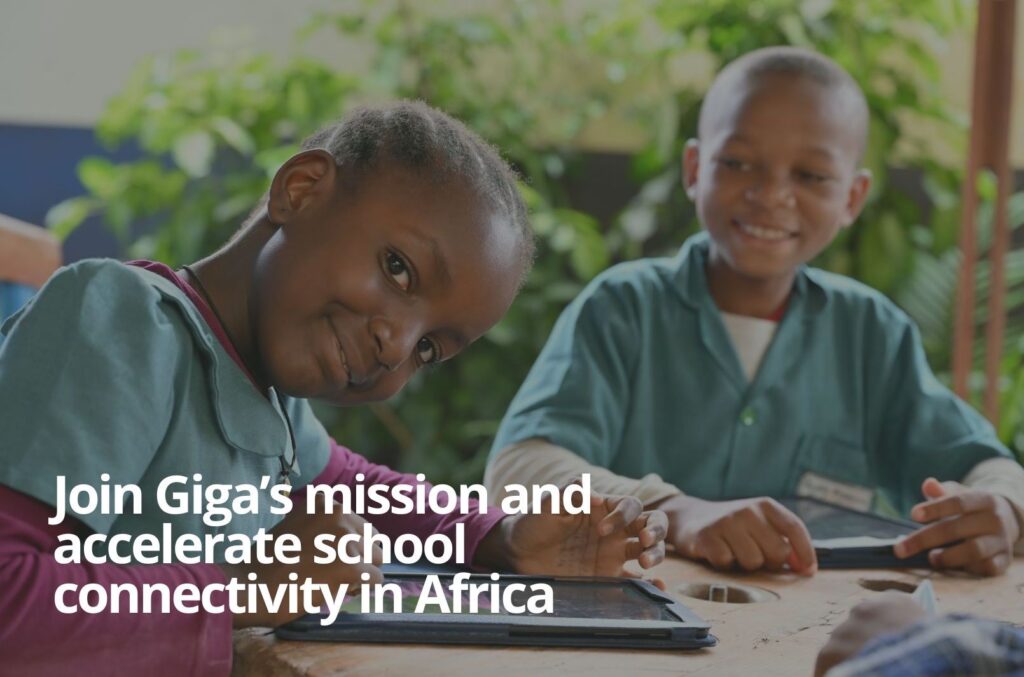Giga’s market assessment on connectivity solutions for schools in Africa underscores the urgent need for governments and industry suppliers to collaborate and overcome the barriers that prevent schools from getting affordable, high-quality internet.
The Internet is more than a tool; it is essential for equitable development and educational opportunity. Yet, 1.3 billion school-age children lack Internet access at home¹, and only half of the world’s schools are connected². This digital divide is even more pronounced in Africa where only 37% of the population uses the internet³, and internet costs are five times higher than the global average.4
As the 2030 deadline to connect every school in Africa draws near, Giga has led the effort to achieve universal school connectivity by employing a range of strategies like mapping, modeling, piloting connectivity prototypes, and streamlining procurement to enhance school connectivity. Despite significant progress, the urgency to quicken our steps is clear. Addressing Africa’s digital divide, which requires an estimated $100 billion according to the ITU5, starts with a $3 billion market opportunity to connect all schools in the continent. Schools are not only centers of learning, but they’re also pivotal for broader infrastructure development, opening avenues for wider internet access and creating new opportunities for industry suppliers and communities alike.6
Giga’s market assessment analyzes the market dynamics that both hinder and support the access to connectivity for schools across Eastern, Western, and Southern Africa. The challenge to connect all schools to the internet is remarkable: there is a need for acceleration, industry incentives to supply internet at scale, political will to invest in connectivity, and clear actions that will bring supply and demand together.
Understanding the Challenge
The assessment highlights the differences in availability of school connectivity services across urban, semi-urban, and rural and remote areas. Urban regions benefit from good telecommunications infrastructure, driven by high population density and commercial activity which, in turn, boosts the profitability for suppliers and supports school connectivity initiatives. Despite these advantages, urban areas in countries such as Malawi, Sierra Leone, and Zimbabwe grapple with affordability of connectivity. In contrast, semi-urban and rural regions face more pronounced challenges due to the logistical and financial hurdles of extending infrastructure, diminished supplier incentives due to lower population density, and exacerbated by more severe issues of affordability and access to essential services.
The study further distinguishes between the usage gap—schools that could access high-quality internet networks but remain unconnected—and the coverage gap, where internet infrastructure is absent. While nations like Kenya, Rwanda, Nigeria, Benin, South Africa, and Botswana are closer to bridging these gaps, with less than 20% of schools lacking coverage, efforts are primarily hindered by the need to address the usage gap. Conversely, in Sierra Leone, Malawi, and Zimbabwe, the challenge is dual, demanding the expansion of network infrastructure for better coverage and addressing usage barriers.
What’s Next for Giga:
Commoditizing School Connectivity Services: In collaboration with UNICEF’s Supply Division (which in 2023 procured $5.2 billion in supplies and services for children), Giga will standardize school connectivity services as a commodity. This will streamline service delivery, simplify the assessment of service quality, spur competition among suppliers, and ease the procurement process for African governments. This step towards commoditization is key to making school connectivity more accessible and affordable across the continent.
Scaled Procurement Strategies: Giga will explore various scaled procurement options, leveraging UNICEF Supply Division’s established practices in other markets. This effort will ensure that African governments have better access to cost-effective and high-quality school connectivity services.
Call to Action: A Collaborative Push
The journey to connect every school in Africa by 2030 requires a collective push from development partners, governments, and industry suppliers. To achieve this goal, we invite you to join Giga in this mission:
Join our mission and collaborate with Giga
2 https://projectconnect.unicef.org/map
³ ITU Facts and Figures 2023: https://www.itu.int/itu-d/reports/statistics/2023/10/10/ff23-internet-use/
4 At the regional level, users in Africa paid more than three times the global median price for mobile broadband services, and over five times the global median for fixed broadband. The Affordability of ICT Services 2022, ITU (2022): https://www.itu.int/en/ITU-D/Statistics/Documents/publications/prices2022/ITU_Price_Brief_2022.pdf
5 Broadband Commission for Sustainable Development (Broadband Commission). 2019. Connecting Africa Through Broadband: A Strategy for doubling connectivity by 2021 and reaching universal access by 2030. https://www.broadbandcommission.org/publication/connecting-africa-through-broadband/ & Connecting humanity: https://www.itu.int/en/mediacentre/Pages/PR16-2020-ITU-publishes-Connecting-Humanity-study.aspx
6 The UN Secretary General’s Policy Brief “A Global Digital Compact (2023)” emphasizes the crucial role of digital connectivity in achieving the Sustainable Development Goals (SDGs) and specifically mentions the importance of connecting schools to the internet as part of a broader strategy to bridge digital divides and enhance educational opportunities. It underlines how digital infrastructure not only facilitates education but also serves as a key element in broader community development, supporting a variety of public services and enhancing access to digital resources: https://www.un.org/sites/un2.un.org/files/our-common-agenda-policy-brief-gobal-digi-compact-en.pdf

